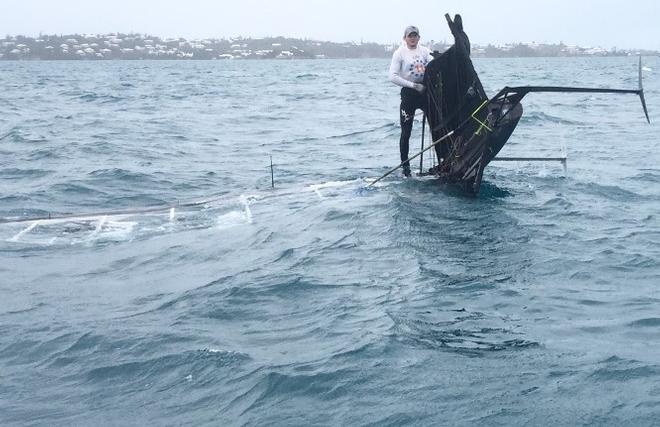Amlin Moth Regatta Bermuda – You're not in trouble when a lion roars
by US Moth Class on 14 Dec 2015

Amlin International Moth Regatta US Moth Class
Amlin International Moth Regatta – 'Youre not in trouble when the lion roars, youre in trouble when it's silent'
'Bermuda is the safest place in the world' according to one very knowledgeable taxi driver. It's an absolute pleasure to visit Bermuda, just for the people alone! It seems that most residents have lived on island their entire lives, some leave for a few years to 'get their wild streak out', but something always brings them back. It's a nice to sail at a venue in which residents love where they live and are excited to share knowledge. The same taxi driver as above explained that it was lettuce growing season, just about every other house had a huge vegetable garden! The island does not import in-season foods until the local source runs out.
This past week the U.S. Moth fleet was able to experience this Bermudian charm first hand. The sailing venue itself was picturesque, a short 30 minute sail out to the Great Sound provided a (mostly) flat water, breezy arena for 53 boats to fly around. Bermuda itself was built atop a volcano, and for this reason there are very few beaches and wonderful sandstone structures everywhere.
The sailors who got a chance to walk barefoot on the beach will agree that this alone is reason for taking every precaution to preserve the 21 square foot island. Unlike beaches created from broken rocks or shells, sand in Bermuda comes from reef fish eating algae off coral reefs and then excreting the 'sand'!
Coral
reefs were brought up by several locals as being in danger, especially with all of the 35th Americas Cup activity. 'The coastal development that's needed for allowing bigger ships demands the physical removal of sections of reefs... Corals do not recover quickly from these impacts, and damaged and unhealthy reefs will entrain changes in fish composition and abundance.' Says marine biologist Samia Sarkis.
The battle these reefs will be fighting over the next year and a half is similar to the fight US moth sailors put up against the Brits. Aside from the obvious difference in boat builder (top guys all used Exocets), the biggest stand out was how boats were handled both heavy air days. British sailor Tom Offer recently took a year off his moth and commented that, 'the biggest difference is in heavy air only the top ten would make it around the course under control, now you actually have to race hard!'
Local sailor Ted Gosling gave a tour of his property, he and his wife Rachel shared one car as enforced by the government. Ted made sure to point out the beautiful tree grown on top of the soak-away pit built adjacent to his house used for domestic wastes. Ted also refuses to eat fish, 'Fishing pressure continues to threaten commercial species and the scope of illegal harvesting of protected species is not known. Recreational fishing is still largely unregulated, apart from species-specific daily catch and size limits and the seasonal closures for some species.' Samia Sarkis
Boat hose down is certainly a topic of interest. In Bermuda, rainwater harvesting is used. The reverse- osmosis systems have been adapted, but the important thing to understand is this process still requires energy.
Unlike San Francisco, the government takes no part to enforce good environmental protection behavior. In terms of the AC35, all of this comes from NGO's and volunteers. Chemical contamination, nutrient pollution and faecal pollution remain long-term threats and no immediate steps are planned for the reduction or mitigation of these issues. It will be up to us to keep Bermuda beautiful!
The US International Moth fleet is grateful to have 11th Hour Racing encouraging the practice of cleaning up the environment wherever they race/ train. Is there something you can enforce at your next regatta? It could be as simple as asking top five regatta leaders to follow some of the guidelines below. Due to advanced planning local Bermudians teamed up to do the following:
-Create a green team
-Use reusable cups and table cloths
-Compost all food and table ware
-Encourage reusable water bottles and Have water refill stations
Give away environmentally friendly boat soap
-Make sure to have plenty of trash, waste, recycling and compost bins
-Offer recycling
-Create spill kits for all support boats
-Use local and sustainable food
-Try to make the event paperless
'We used the Sailor's for the Sea best
practices list to guide us' says Molly MacMillan White.
The Amlin Internationl Moth regatta was used as a trial run for the 35th Americas Cup. Thoughts and changes will be made so the impact from athletes/fans in 2017 is minimal.
Congratulations to Robert Greenhalgh who began the final day in second, won all three races and came home with $5,000 of the $10,000 prize purse. To read more about the regatta visit the event Facebook
page.
As sailors left the Bermuda airport, instead of hearing the typical 'if you see something, say something, or don't leave bags unattended', the PA system message was, 'we recycle, help us keep Bermuda beautiful by finding the appropriate trash bins. This just goes to show how safe the island is and the immediate concern is all about the environment.
If you want to link to this article then please use this URL: www.sail-world.com/140880